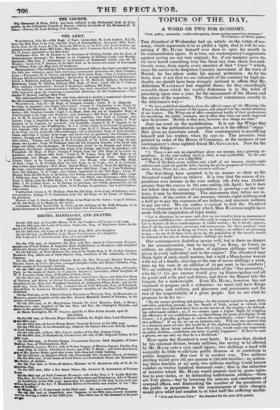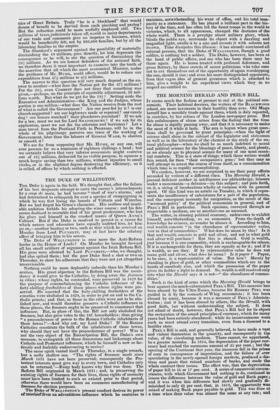TOPICS OF THE DAY.
A WORD OR TWO FOR ECONOMY.
" Low, paltry, miserable, eandle.end-sparing, cheese-paring-preserving measures."
WETHERELL ON HUIRE, I/GAHM,
THE Standard of Wednesday had an article on the virtue of eco- nomy, which represents it in so pitiful a light, that it will be sur- prising if Mr. HUME himself ever dare to open his mouth in its commendation again. It is true, our contemporary's arguments against saving are not very original; for, if our memory serve us, we have heard something very like them any time these five-and- twenty years, from nearly every member of that " Crew" * which, since the never-to-be-forgotten Country movement of the town of Bristol, he has taken under his special protection. As for his facts, were it not that we are informed of the contrary by high au- thority, we should have been strongly inclined to affirm that Mr. Alderman WAITHMAN had supplied them; for they, exceedingly resemble those which the worthy Alderman is in the habit of preaching upon once a year, for the amusement of the House and the solace of the reporters. The Standard commences exactly in the Alderman's way-
" We have published elsewhere, front the official organ of the Ministry [the Times], the financial account of the empire, and submit it to the careful attention of our readers. The Whigs out of office complained loudly of their predecessors for mystifyingthe public accounts, but in office they have not much improved upon the practice. Mystify as they may, however, two things are clear.'
Just one word on the mystification. It is not the Whigs that mystify in the publication in question, nor is it the official "organ" that gives an uncertain sound. Our contemporary is mystifying himself and his readers when he says so. The accounts were printed by order of the House of Commons, at the instance of our contemporary's clear-sighted friend Mr. Goinatuitiv. Now for the two clear things-
" 1. There is not only an expenditure above our income, but a growing ex- penditure. In the year ending April 5, 1832, it was 1,240,0001. In the year ending July. 5, 1832, it was 1,263,0001.
" That of the forty-seven millions and a half of our income, twenty-eight millions and a half are paid for debt ; leaving for all the purposes of Civil Govern- ment, Army, Navy, &a., &c., about nineteen millions.
The first thing here asserted is by no means so clear as the Standard would have us believe. It is true that the excess of ex- penditure over income in the year ending 5th July was 23,000/. greater than the excess in the year ending 5th April; but it does not follow that the excess of expenditure is growing—on the con- trary, it may be diminishing. The statements that follow are in- dubitable : of the entire of our revenue, twenty-eight millions and a half go to pay the expenses of our fathers, and nineteen millions to pay our own. We are rather snrerised to find the Standard waxing eloquent on a discovery which Miss BAGSTER might have made without imputation of legal sanity.
" Let it, therefore, be no more said, that we are taxed to keep up enormous or overgrown establishments—ground to the earth to support kings and sinecurists. Let us dismiss all these commonplaces of rabble oratory ; for it hereby appears, that if all the expenditure, necessary and unnecessary, for these purposes were struck off,—if we had no King, no Court, no Judges, no soldiers, no placemen to pay,—we say if all these were given up, the population of the country would be relieved at the rate of about eighteen shillings per head."
Our contemporary doubtless means well, but is there no danger in the announcement, that by having "no King, no Court, no soldiers, no placemen," a bonus of eighteen shillings would be given to every individual soul in the empire ? The Standard may think light of such small matters, but would a Manchester weaver with ten of a family, starving at the rate of seven shillings a week, turn up his nose at an addition of 50 per cent. to his comforts ? We say nothing of the thriving households of the "fine peasantry," who for 71. 15& per annum would give up Emancipation and all its goods and evils past and future, and throw the Repeal into the bargain for a makeweight. Even Mr. HUME, however, has not ventured to propose such a reduction: we must still have Kings and Courts, and soldiers, and placemen and pensioners, and the rest of the respectability of a great people. Let us see what he proposes to do for us- " By the utmost pinching and paring—by the grossest injustice to poor clerks and other underling persons—by the breach of faith, actual or virtual, with persons who have devoted their lives to the service of the country—by defraud- ing unfortunate soldiers; or, if we venture upon a higher flight, by crippling the efficiency of our establishments, or diminishing the grace and dignity of the Crown ; it is possible, perhaps, to reduce the expenditure—what? shall we say two millions? If we do, we say an immense sum. Will any one contend that in a financial point of view this would be of the slightest benefit to the country, or that the figure being reduced from 471 to 451, would make any impression on public distress,—contribute one atom to public happiness? If there be such a person, we can only say that he is a blockhead."
Here again the Standard is over hasty. It is true that, divided by his constant divisor, twenty millions, the saving to be effected by Mr. HUMS cuts a very small figure ; two shillings a head will assuredly do little to alleviate public distress or to contribute to public happiness. But view it in another way. Two millions sterling would give 10/. per annum to 200,000 families ; or, reckon- ing these families at six each, two millions sterling would bestow comfort on twelve hundred thousand souls ; that is, the reduction of taxation which Mr. HUMS would propose (not by gross injus- tice to poor clerks, or by defrauding unfortunate soldiers,—these are Tory plans,—but by lowering the salaries and emoluments of overpaid offices, and diminishing the number of the guardians of the public in proportion to the requirements of their charge), would give relief and comfort to at least half the suffering mecha7
• • Peel Lula Dawson Crew." See Standard for the year 1830, passim.
nibs of Great Britain. Truly "he is a blockhead" that would dream of benefit to be der;ved from such pinching and paring! But the reduction could be more usefully employed still. Two millions of taxes judiciously taken off, would in many departments of our trade and commerce give an impetus to business, which would be beneficially felt, not by 200,000 families, but by all the labouring families in the empire. The Standard's argument against the possibility of materially diminishing the 19 millions, goes directly, let him deprecate the consequence as he will, to stir the question of diminishing the 28 millions. As we are honest defenders of the national faith, we therefore deem it most important to examine into the truth of the assertion that all which the most economical Minister, under the guidance of Mr. HUME, could effect, would be to reduce our expenditure from 473: millions to 4- millions. The answer to this question will very much depend on the an- swer to another—what does the Nation get for the 474. millions ? For the 284-, even COBBETT does not- deny that something was given,—perhaps, on the principle of equitable adjustment, 20 mil- lions north. But what do we get for the 19N ? Setting aside the Executive and Administrative—the King and the Judges, whose portion is one million—what does the Nation receive from the rest of what is called the Government? Are our poor fed by it ? is our church supported? are our highways made or repaired? our canals dug? our houses watched? their plunderers punished? If we ask for a law, must we not fee Lord SHAFTESBURY? if we ask for its application, must we not fee the attornies and barristers? Let a man travel from the Pentland Firth to Penzance, will he in the whole of his pilgrimage perceive one trace of the working of Government, later than the labours of General WADE, to shorten or smooth it?
We are far from supposing that Mr. HUME, or any one, will ever procure for us a remission of eighteen shillings a head ; but we certainly believe that very inferior economists might contrive out of 18:1- millions, disbursed for no visible purpose, to squeeze a much larger saving than two millions, without injustice to-small clerks, or in the slightest degree destroying the efficiency, as it is called, of offices by which nothing is effected.



























 Previous page
Previous page